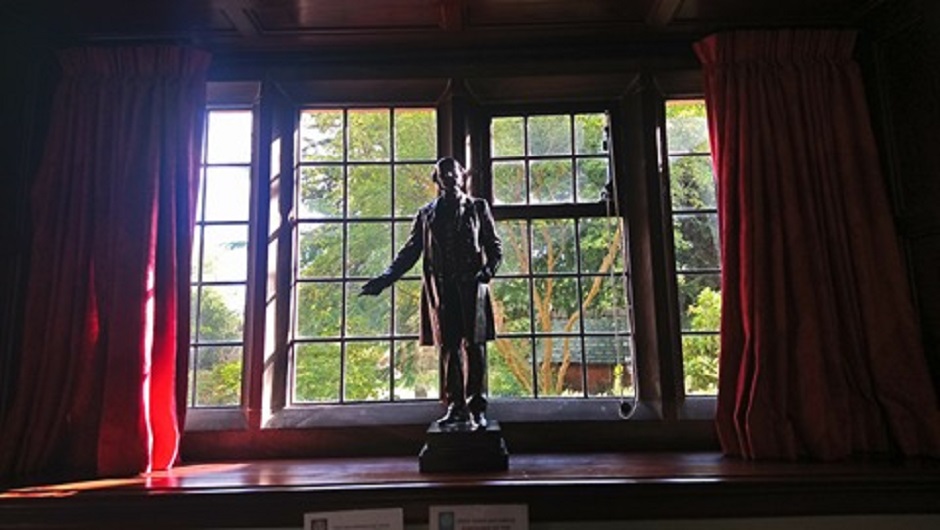This is an account of an intern, fresh off the back of her first month working at Gladstone’s Library...
If you were to come on a ‘Glimpse’ of our Reading Rooms and happened to have me as your guide I would tell you that our History Room, which overlooks the Enquiry Desk where I spend most of my time, houses the Gladstone Foundation Collection. This is the 32,000 books that Gladstone himself wrapped in brown paper and white string, placed in a wheelbarrow and transported from his study (which he dubbed the 'Temple of Peace') in Hawarden Castle to the brand new library just down the road, back in 1896. (While this is a lovely mythology, Gladstone was in his late 80s by this time so it is much more likely that he either had an army of servants hovering behind him terrified he would fall or he oversaw the whole process, clipboard in hand.) Thanks to his extensive diaries, we know that he read at least 22,000 of those books. That is an intimidating number to work in the shadow of whilst simply trying to make it through the tasks assigned to any one particular day.?
During my time here I have (unsurprisingly) learnt quite a bit about W. E. Gladstone. For example, he could speak five languages (excluding English and including Italian which he somehow found the time to teach himself!). He graduated with a double first in Classics and Mathematics. During his time at Eton he developed his own classification scheme for books; because what else would a teenage schoolboy do with his time other than mess around with the Dewey decimal system? When faced with the problem of too many books, did Gladstone resort to piles of Classical literature and Theological texts scattered around the Temple of Peace? Of course not! Instead he invented a brand new three-sided bookshelf. All this I couldn’t help but compare to my own progress. I have a passing knowledge of French, and a frankly embarrassing lack of Spanish considering the amount of time spent studying it. When I have run out of shelf space for my books, I like to think that they are kept in artful piles around my room but sadly there is no rhyme or reason to their organisation.?And while my own academic record is nothing to be ashamed of, it’s certainly no Oxford double first!
So, I decided to learn more about William Ewart Gladstone beyond the political legacy he had left behind. He seemed to me to possess some sort of super-human aptitude for every subject under the sun. I was desperate to find something to which I could related in this incredible monument of a man.?
I have been warned to keep this short so here are my top three ‘humanising Gladstone’ facts:?
- I came across a description of Gladstone by Walter Bagehot as ‘Oxford on the surface but Liverpool below'. Gladstone was born in Liverpool and though spent his adolescence at both Eton and Oxford never lost the Liverpudlian notes in his voice. (If you’re interested here is a link to a recording of the great man himself speaking in 1888. As a fellow scouser this grants him unlimited respect from me.?
- I also found that in the later years of his life he was slightly embarrassed by the passionate beliefs that a younger Gladstone had once held. Especially when they were used against him in Parliament by his nemesis Disraeli. This was perhaps the inspiration behind one of the all-time best Gladstone quotes: ‘No one ever became great, except through many mistakes’. Something which is always a comfort when you're fumbling your way through the first few weeks of a new job!?
- He personally had no interest in Maths as a subject and only added it to his degree because it was a subject he excelled in and he wanted the accolade of a double first.?This is possibly my favourite fact because honestly, it's something that I would definitely do myself – sadly an understanding of Maths has always eluded me. ?
These are just a few of the things that have made me change my view on Gladstone’s presence around me. Though I’m still in awe I now find myself more inspired rather than?intimidated. To me the Grand Old Man has become a constant reminder that so much can be achieved in a lifetime if you have the willpower to make it so.??
And, on top of that, it’s always good to remember that even Gladstone died with 10,000 books on his to-read list.
By Elspeth Brodie-Browne, Intern

